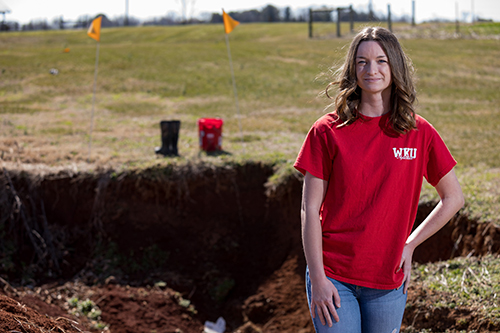WKU News
Agriculture student studies methods to control diseases in crops
- Jacob Shilts and Alicia Carter
- Wednesday, March 23rd, 2022

Laney Newton, a senior from Caneyville majoring in agriculture, spent last summer as an intern at the University of Kentucky Research and Education Center in Princeton with Extension Plant Pathologist Dr. Carl Bradley and his team conducting research on diseases of soybeans and small grains.
“I researched different methods to control diseases in soybeans and small grain crops like wheat, barley and rye. Just as people and animals can get sick, so can plants. The group I worked for looked at the efficacy of using cultural control methods, like crop rotation, and chemical methods, like fungicide seed treatments and foliar sprays,” Newton said. “It was a really great experience. I got to branch out and meet new people.”
Newton hopes to make an impact on the agriculture industry and said her research and work in product development is already assisting farmers.
“This research is important because crop diseases can cause extensive yield losses if not controlled and managed properly. The yield losses can cut into a farmer's profit margins, which are already thin in some cases,” Newton said.
Researching the most effective and affordable ways to protect yield helps farmers stay in production.
“Crop diseases can cause a product to have a lower quality. Some fungal diseases produce toxins that cause adverse health effects on the livestock or people that may consume them. Testing is done to be sure that these products do not enter the food supply for livestock or people. The crops cannot be used when they contain these toxins. Researching crop disease control methods helps prevent loss for farmers and improves the quality of the commodity that is produced. This research helps our population with a higher quality food supply and reduces crop losses and food waste,” Newton said.
Newton acquired the internship with the help of her advisor, WKU Department of Agriculture and Food Science Professor of Agronomy, Dr. Todd Willian. She credits WKU and the advising offered by Dr. Willian for assisting in her success as an undergraduate student. She said the advising at WKU helped shape her career path.
Newton’s time at WKU is filled with hands-on research experiences. She spent time working inside labs, taking courses at the WKU Agriculture and Research Education Center, (also known as the WKU Farm) traveling to focus on research and taking part in unique opportunities to see a variety of agriculture operations.
Newton also participates in the WKU Soil Judging Team, a student team that competes regionally and nationally against other colleges and universities. The team practices by traveling to look at the characteristics of different soils in the area. Once the soil characteristics are determined, the team decides how to best use the soil to its potential, with a focus on sustainable use. Newton said she is looking forward to competing for the first time at the Southeastern Regional Competition this fall.
Soil judging was also a large part of a course Newton took in soil formation, classification and mapping with WKU Department of Agriculture and Food Science Professor of Agronomy, Dr. Becky Gilfillen.
“My favorite part of the class was the hands-on learning experience from having class at the soil pits,” Newton said.
After graduation, Newton plans to go back to school to earn a master’s degree, and she has her sights set on a Ph.D. program in the future.
--
To learn more about earning a degree in Agriculture at WKU, visit https://www.wku.edu/agriculture/
Some of the links on this page may require additional software to view.

